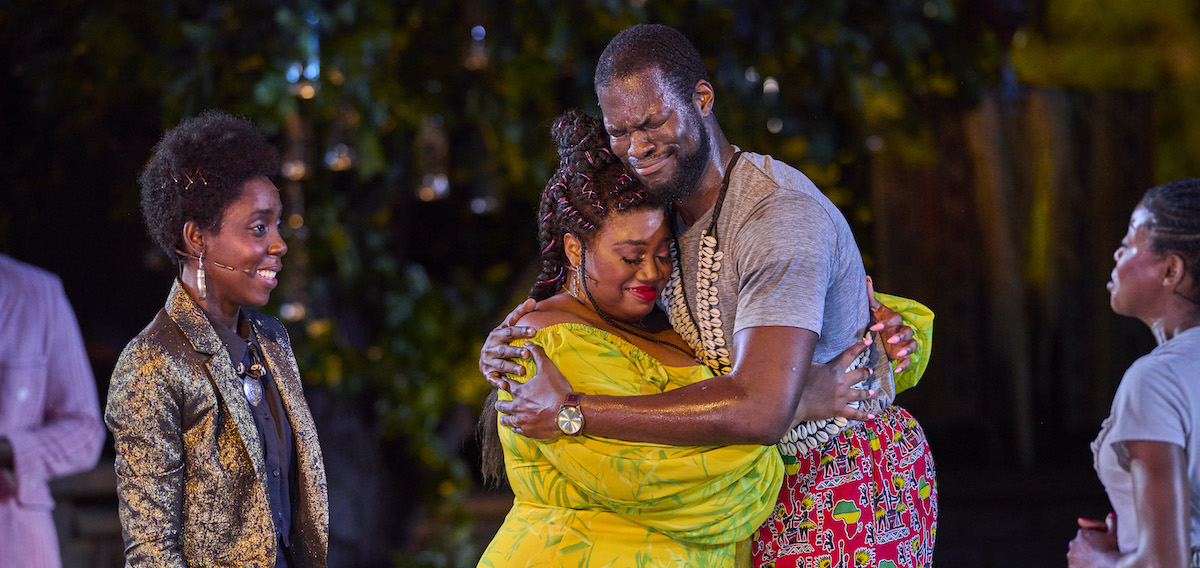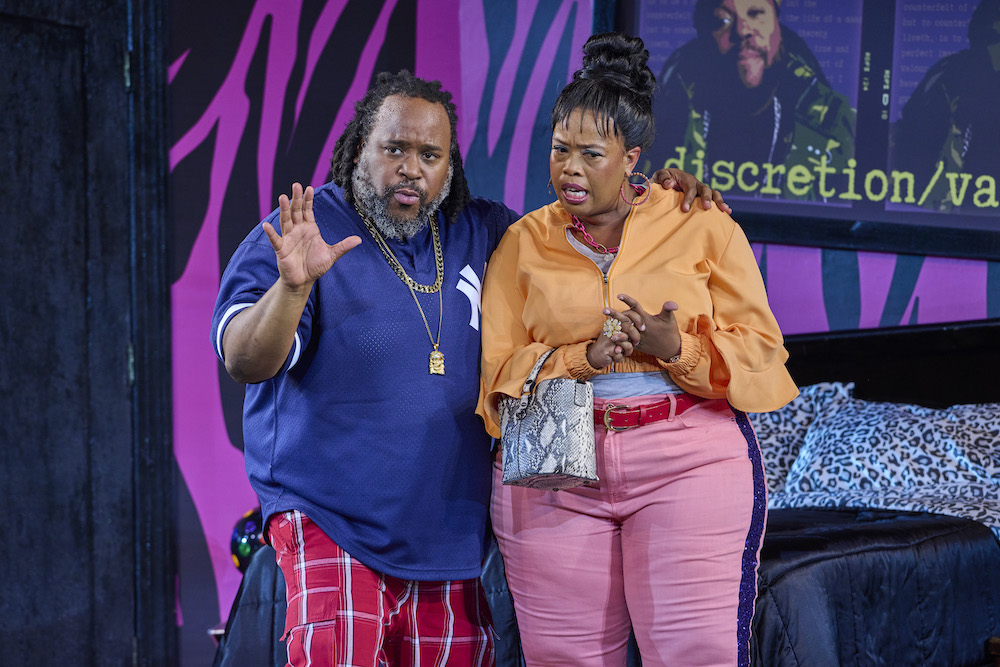Culture

Dr. Samuel Crowl discusses the evergreen brilliance of Shakespeare in light of PBS’ ‘Great Performances: Merry Wives’
By: Emily Votaw
Posted on:
To some, Shakespeare’s plays are just that, plays – works of dramatic theatre intended for an audience. To others, Shakespeare’s many works are some of the finest examples of poetry in the English language.
Perhaps what unites these two camps is a belief that first and foremost, although these works were penned over four centuries ago, the stories they tell are still vibrant and true to the human experience in ways other works could only hope to be.
Acclaimed Ghanaian-American playwright Jocelyn Bioh is one of many contemporary writers and thinkers who believe there is still plenty of life left in the works of the Bard. On Friday, May 20 at 9 p.m. ET, WOUB-TV will broadcast “Great Performances: Merry Wives,” Bioh’s adaptation of Shakespeare’s “The Merry Wives of Windsor.”

Bioh’s take on the classic comedy moves it from Windsor, a town in Berkshire, England to South Harlem – where the play is inhabited not by the English middle class of the 1600s, but immigrants of the African Diaspora.
Dr. Samuel Crowl is a Trustee Professor of English Emeritus at Ohio University and a Shakespeare scholar. Crowl said the long tradition of adapting Shakespeare’s works is a testament to the depth of them.
“Shakespeare’s impossible to kill. He has the audience in the theater, not just the audience in the academy. He’s also attractive to actors. Actors want to play his characters. And he’s also attractive to writers who want play with his works,” said Crowl. “They know he’s a great, but his greatness is so rich, and so open-ended, and so inviting and so hospitable that they can feel comfortable tweaking his works without feeling like they are committing some kind of sacrilege.”
Crowl said central to the themes and general plot of “The Merry Wives of Windsor” is Sir John Falstaff, who was introduced to audiences in Shakespeare’s “Henry IV, Part One.”
“In the middle of a historical drama, Shakespeare plumed down his greatest comic creation: Falstaff. Falstaff waddles into the play out of Shakespeare’s imagination, and not from the history books, because he’s the sort of person who wouldn’t be in the history books,” said Crowl. “ That’s what great writers can do. They can use their imaginations to populate a world with characters who would not have been those that the historians were recording. The audience loved Falstaff. He was funny, he was witty, he was subversive — he was sort of the audience’s voice.”
“Shakespeare’s impossible to kill. He has the audience in the theater, not just the audience in the academy. He’s also attractive to actors. Actors want to play his characters. And he’s also attractive to writers who want play with his works. They know he’s a great, but his greatness is so rich, and so open-ended, and so inviting and so hospitable that they can feel comfortable tweaking his works without feeling like they are committing some kind of sacrilege.” – Dr. Samuel Crowl
Shakespeare brought Falstaff back in “Henry IV, Part 2,” growing the character’s popularity further.
“There were more individual private, one volume additions of “Henry VI, Part I” than of any other Shakespeare play. We would’ve thought that would be “Hamlet” or “King Lear” or “Midsummer Night’s Dream.” No, it’s “Henry IV, Part I.” And it’s because the people and the audience loved Falstaff,” said Crowl.
Crowl said Shakespeare attempted to conclude Falstaff’s story by kicking off “Henry V” with a eulogy for the character. However, Falstaff wasn’t quite done entertaining audiences, even if Shakespeare might have wanted him to be.
“The wonderful and apocryphal story is that Queen Elizabeth told Shakespeare that he couldn’t kill off Falstaff. She told him ‘I want you to bring back Falstaff and write a play about Fallstaff in love!’ So that’s what Shakespeare does in “The Merry Wives of Windsor,” Crowl said.
“The Merry Wives of Windsor” begins with a broke Falstaff arriving in Windsor. He immediately begins cooking up a get rich quick scheme for the ages: he’s going to try and win the affections of two middle class women in Windsor so he can take advantage of their financial health.
The two women are immediately onto Falstaff’s plans (he sends them identical love letters right away) and seek to, comically, bring him to his knees.
Crowl first fell in love with Shakespeare after his parents added a stop to see a live production of “Richard III” at the 1953 Stratford Shakespearean Festival to their agenda for a vacation to a fishing camp in upper Ontario. Crowl’s parents were big fans of the British actor Alec Guinness, who had been cast in the production as the titular Richard III.
Although Crowl had no way of knowing it at the time, this would be the igniting spark of what would be a long career as a Shakespeare scholar which would ultimately redefine the way Shakespeare is conceptualized in an academic space.
Attending the Stratford Shakespearean Festival became an established part of Crowl’s family vacations. The summer before Crowl left for college, the featured festival production was “Henry IV, Part I,” which would also be the first thing Crowl was assigned in his freshman literature course at Hamilton College. Having just seen the production as a theater piece greatly impacted Crowl’s interpretation of the text.
“I came to Shakespeare first by seeing his works. My parents were confident that they could take a 12 or 13 year old off to a Shakespeare play and that he could somehow figure it out – or figure out what was enjoyable about it. At first, Shakespeare wasn’t connected to the text or with having to read the text or interpret it,” said Crowl. “I found that incredibly helpful when first in high school and then in college, I first read Shakespeare. Because I understood that the characters were really people talking to each other – that it wasn’t just all this poetry that got a little dense sometimes. I realized early on that if you read Shakespeare out loud, suddenly you weren’t having to stop and think ‘okay, what is this character talking about?’”
Crowl would find that approaching Shakespeare in an academic space from a performance perspective just wasn’t done in academia at the time.
“He was taught as a great poet — as someone to read, as the greatest of all English writers,” said Crowl. “My Shakespeare professor was himself a dramatic personality, as many Shakespeare professors are, but he didn’t teach the plays from the point of view of performance. Even when I then went to graduate school and studied with one of the greatest of all American Shakespeare critics of the second half of the 20th century, C.L. Barber, the focus was still on the text.”
When Crowl began his career at Ohio University in 1970, he found that very few of his students could really connect to Shakespeare the way that seeing Shakespeare performed had allowed him to.
“I realized that my kids hadn’t seen him. They had no idea what it looked like on the stage. So I knew that there were films out there — most of which had been dismissed by Shakespeareans as being beneath him and vulgar or crass. And so I thought maybe I could put together some of these films to show to them as a way of making the plays come alive, even though film was a very different medium,” he said. “So I got a little grant from University College that paid for the rental of the films and did what turned out to be the first course in the country on Shakespeare in film.”
Quickly, Crowl began to feel he was onto something.
“I suddenly began seeing that some of these films were better than they had been given credit for. And they were wide open to be talked about in an academic sense because nobody had been in there working on them. So I started writing about them and doing little papers here and there meeting like-minded young people who were getting into this themselves and out of that sprung a career in which I’ve written six books on Shakespeare and performance and Shakespeare on film,” Crowl said.
Simultaneously, Shakespeare on film was coming to be a real part of the zeitgeist. It was the ‘90s, a decade Crowl referred to as “the best decade in the history of Shakespeare on film.”
“We got about 20 major Anglo-American Shakespeare films, so suddenly there was plenty of material to work with,” said Crowl. “And so that’s my story. And that’s Shakespeare’s story too – that you just can’t kill him. He’ll just pop up somewhere else!”

